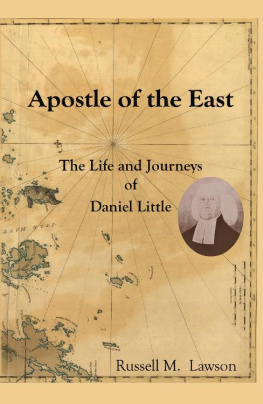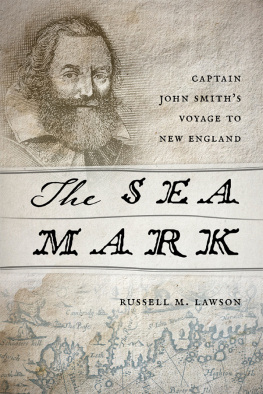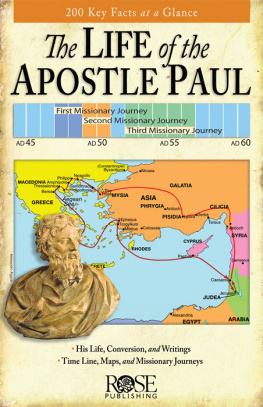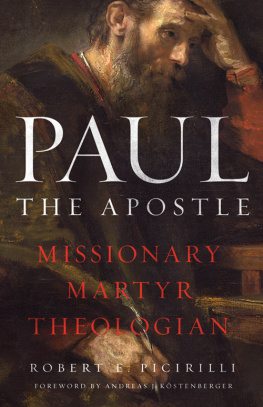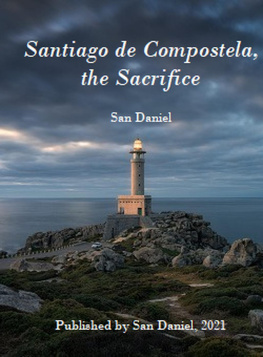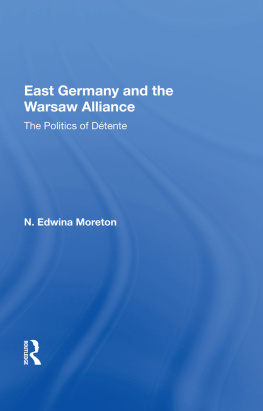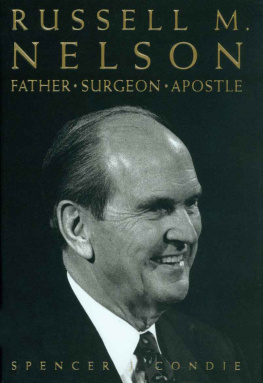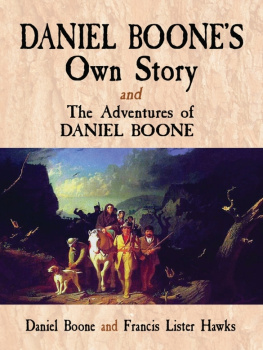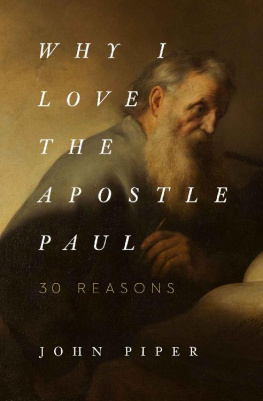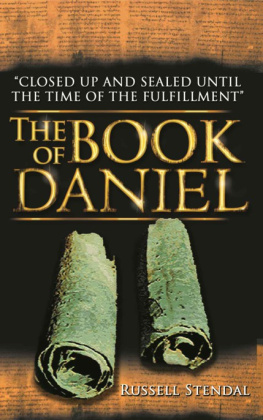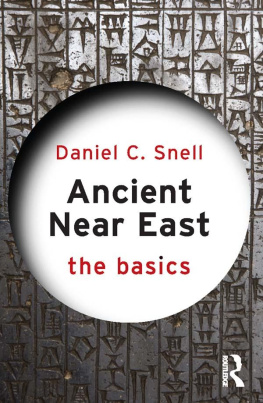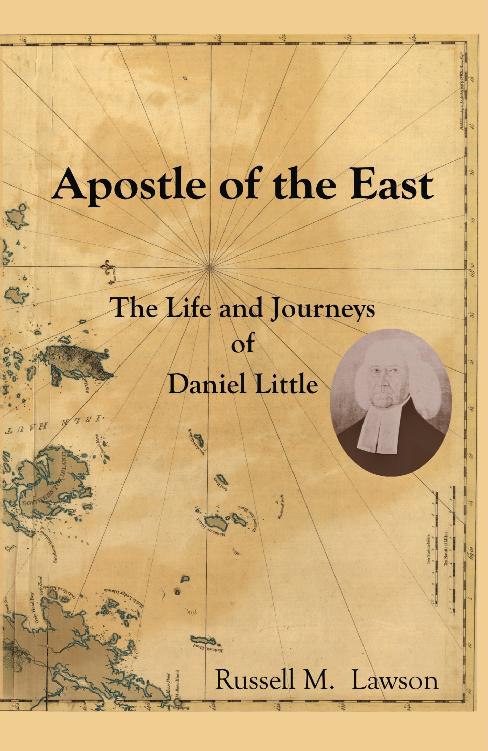Dedication
For the men of the Brotherhood of St. Andrew
St. John s Episcopal Church
Tulsa, Oklahoma

Portrait of Daniel Little
Courtesy of the Unitarian Universalist Church, Kennebunk, Maine
Contents
He was an earnest, vigilant, industrious and faithful watchman
over the great interests of humanity; a true disciple of his Lord and Master.
- Bourne, History of Wells and Kennebunk
1 The Whistle
Humans are subject to the tyranny of time. At a single moment, a person's life changes, takes a different direction than that heretofore. Humans try to track such instances, narrow them to a specific date, time of day, hour and minute, to attempt to exert some feeble control over what is uncontrollable. Other instances cannot be dated, are not subject to clocks and calendars. They just happen, vaguely but definitively.
At such a moment, Daniel Little was walking along the road returning home from the port, where he had journeyed earlier that day to inquire about a shipment of furniture he had been expecting. His business concluded, he departed for the two mile walk along the Port Road back to the parsonage, where he and his wife and children lived in a small village called Kennebunk. Little had lived in Kennebunk for half a dozen years, having accepted the call of the Second Parish in 1751 to minister to their needs. He had in 1752 built a snug two-story dwelling on the outskirts of the village on the road to the port. The Kennebunk River was just north of his home. He had a fine garden, a quiet life, a stable existence, and considered himself happy, blessed by God.
Little was a native of Newburyport, Massachusetts, and had grown up in nearby Haverhill. He had been well-educated by private tutors and had become a gifted Gospel minister. He arrived in Maine at a time between wars, when there appeared to be a modicum of peace, the previous conflict, King George's War, having been concluded a few years earlier. The inhabitants of Maine had, unlike some British-American settlements in North America, generally been spared the worst of recent warfare. Rarely did Maine homesteaders fear for their lives from attacking French and, particularly, their Abenaki allies. Indeed the British had been on the offensive against Indian tribes and the French during King George's War, and the Indians had the worst of it. Likewise when war broke out again in 1755, Maine seacoast communities were largely spared the violence that others further west and south experienced. There was, then, during the French-Indian War, a slight sense of security in Maine seacoast communities that previous generations would have hardly felt.
Daniel Little was walking alone this day on the road from the port, approaching a bridge crossing a tidal inlet, feeling full and satisfied, his thoughts wandering about his favorite themesthe wonderful plenty of the land; the rich fodder, marsh hay, bending in the breeze; the cool, moist air promising much for the farm community; God's benevolence revealed in naturewhen a sudden noise interrupted his solitude. A whistle. Not the whistle of a gull or hawk, or the whistle of the wind blowing through birches and pines. Rather an artificial whistle made by a contrived instrument. Little had heard the pewter and wood whistles used by militiamen on training days, but this one somehow sounded different, ominous. There was no militia training that day. All was quiet save the brief shrill of the whistle. Uncertain, afraid and cautious, Little slipped from the road and hid in the tall marsh grasses next to the bridge support. A whistle implied at least two separate warriors or warrior-bands. Had they seen him? Were they coming even now to capture him? He thought of his family, his widowed wife, his fatherless children. Even if the raiders had not seen him, they would use the road, cross the bridge, as he had. Little, knowing he must depart quickly, crawled on his hands and knees in the shallow, rank water of the marsh, provided by the grace of God to protect him; he moved slowly away from the bridge. He heard soft footsteps. He glimpsed a warrior. Stories from the past descended upon him.
A child in Haverhill, growing up during Dummer's War, when there was so much talk of militia hunting scalps, paid for by the Province of Massachusetts according to the age and gender of the deceased; listening to the bravado of the soldiers mixed with the fear in peoples' voices of the savagery of the enemy, of the barbarism, of how they treated defenseless children and women, though they learned their lesson when they captured the likes of Hannah Duston during King William's War, who paid them back fully, taking their scalps and bringing them to Haverhill. Indians and French attacked the town again in Queen Anne's War, just a dozen years before Little's birth. Other towns besides Haverhillsuch as Deerfield, Dover, Oyster River, Salmon Falls, Yorkin Massachusetts, New Hampshire, and Maine experienced the silent incursions of the enemy, the killing of the innocent, the capture of women and children. The people of the time considered the Indians worse than dogs. Ministers in the pulpit condemned them as agents of the Enemy. They were a silent, nefarious force of evil, unexpected, merciless.
The warriors Little saw, if he got a good look, were scantily clad save for a breech-cloth and moccasins and leggings reaching to the upper thigh, but nothing about the stomach and chest. They were strong, tattooed, their head shaved except for a scalp-lock. They were armed with bow and arrow, or a musket, and a war ax with a stone or iron head. The minister crawled along the narrow tidal channels that marked the marshland, which allowed him to go undetected. He made his way in a westerly direction for a long time until he no longer heard the sounds of men, and feeling that he had escaped the immediate danger, quickly rushed back to the parsonage, paralleling the road, fearing the worst, praying for the best.
Little found that all was well. Indeed the raiders had come and gone without attacking anyone; all in the community were saved. But something had changed in the mind of the pastor. The peace that he had felt before the incident had vanished with the raiders. Little kept his possessions, family, friends, and life, but not his peace. There was now a blot on contentment. The presence of evil, Little knew from the Bible, is constant, ubiquitousbut hitherto he had rarely known it. Evil was theoretical, something to be talked about, a theological concept, like Adam and Eve's sin, a distant reality that never quite penetrated the body and mind. Evil, like God, transcends the moment, and though Little was aware of its existence, he had never felt it overwhelm the present. Until now. Evil is present, possible at any moment.
He could never rid himself of the sound of the whistle.
***
Daniel Little became, within twenty years, the Apostle of the Eastso-called by his contemporaries and admirers for his many journeys along Maine's eastern frontier to minister to English settlers and the Indians particularly of the Penobscot valley. Little made repeated journeys before and after America's War for Independence. He was a restless adventurer, a messenger for Christ. So many of his ilk, the hundreds of Protestant clergymen of small New England towns, never ventured forth; they were content to stay put, to battle sin among their own neighbors, to shepherd the flock in the daily cares of life, to administer the sacraments of baptism and communion, to teach and preach, counsel and condole. Little did all of these as well during his long tenure as pastor of the Second Parish of Wells, Mainewhat became the First Parish of Kennebunk. He served the people for over fifty years. But all of this activity as a pastor, the responsibilities of a large family, the intellectual demands on a Christian minister, were insufficient. Little felt compelled to do more.

